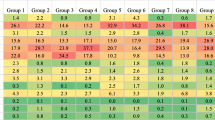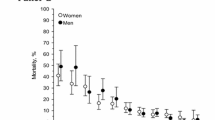Abstract
The objective of this study was to assess how disease burden caused by chronic conditions is related to mortality (predictive validity) and other health outcomes (convergent validity). This was studied in 625 community-dwelling adults living in Spain aged 65 years and older. Disease burden was measured with the Disease Burden Morbidity Assessment (DBMA). The association with 5-year mortality was assessed using a Cox model and Kaplan–Meier curves. For convergent validity, mean age, sex ratio, patient-centered outcomes and healthcare utilization were compared for high and low DBMA scores (< 10 vs. ≥ 10). Also, a multivariable linear regression model was used to evaluate the DBMA as a function of these variables. Mean DBMA score in our sample was 7.5. After 5 years, 35 participants had died (5.5%). The Cox model displayed a hazard ratio of 1.07, and the Kaplan–Meier curves showed lower survival for high DBMA scores. Among participants with high DBMA scores, low self-perceived health, disability and female sex were more frequent, and this group showed lower mean scores for quality of life (Personal Wellbeing Index), affect balance (Scale of Positive and Negative Experience) and physical activity (Yale Physical Activity Survey), higher mean age and higher healthcare utilization than persons with low DBMA scores. In the multivariable regression, all variables but age were significantly associated with the DBMA. In conclusion, the DBMA showed satisfactory predictive and convergent validity. In our aging society, it can be applied to better understand and improve care for older persons with multiple chronic conditions.


Similar content being viewed by others
References
Barnett K, Mercer SW, Norbury M et al (2012) Epidemiology of multimorbidity and implications for health care, research, and medical education: a cross-sectional study. Lancet 380:37–43. https://doi.org/10.1016/S0140-6736(12)60240-2
Bayliss EA, Ellis JL, Steiner JF (2005) Subjective assessments of comorbidity correlate with quality of life health outcomes: initial validation of a comorbidity assessment instrument. Health Qual Life Outcomes 3:51. https://doi.org/10.1186/1477-7525-3-51
Bayliss EA, Ellis JL, Steiner JF (2009) Seniors’ self-reported multimorbidity captured biopsychosocial factors not incorporated in two other data-based morbidity measures. J Clin Epidemiol 62:550–557.e1. https://doi.org/10.1016/j.jclinepi.2008.05.002
Bayliss EA, Ellis JL, Shoup JA et al (2012) Association of patient-centered outcomes with patient-reported and ICD-9-based morbidity measures. Ann Fam Med 10:126–133. https://doi.org/10.1370/afm.1364
Bendayan R, Cooper R, Wloch EG et al (2016) Hierarchy and speed of loss in physical functioning: a comparison across older U.S. and English men and women. J Gerontol A Biol Sci Med Sci. https://doi.org/10.1093/gerona/glw209
Brown DS, Thompson WW, Zack MM et al (2015) Associations between health-related quality of life and mortality in older adults. Prev Sci 16:21–30. https://doi.org/10.1007/s11121-013-0437-z
Byles JE, D’Este C, Parkinson L et al (2005) Single index of multimorbidity did not predict multiple outcomes. J Clin Epidemiol 58:997–1005. https://doi.org/10.1016/j.jclinepi.2005.02.025
Charlson ME, Pompei P, Ales KL, MacKenzie CR (1987) A new method of classifying prognostic comorbidity in longitudinal studies: development and validation. J Chronic Dis 40:373–383. https://doi.org/10.1016/0021-9681(87)90171-8
Charlson ME, Charlson RE, Peterson JC et al (2008) The Charlson comorbidity index is adapted to predict costs of chronic disease in primary care patients. J Clin Epidemiol 61:1234–1240. https://doi.org/10.1016/j.jclinepi.2008.01.006
Cummins RA (2009) Subjective wellbeing, homeostatically protected mood and depression: a synthesis. J Happiness Stud 11:1–17. https://doi.org/10.1007/s10902-009-9167-0
Diener E, Wirtz D, Tov W et al (2009) New well-being measures: short scales to assess flourishing and positive and negative feelings. Soc Indic Res 97:143–156. https://doi.org/10.1007/s11205-009-9493-y
Dipietro L, Caspersen CJ, Ostfeld AM, Nadel ER (1993) A survey for assessing physical activity among older adults. Med Sci Sports Exerc 25:628–642. https://doi.org/10.1249/00005768-199305000-00016
Elixhauser A, Steiner C, Harris DR, Coffey RM (1998) Comorbidity measures for use with administrative data. Med Care 36:8–27. https://doi.org/10.1097/00005650-199801000-00004
Fernandez-Martinez B, Prieto-Flores M-E, Forjaz MJ et al (2012) Self-perceived health status in older adults: regional and sociodemographic inequalities in Spain. Revista de Saúde Pública 46:310–319. https://doi.org/10.1590/S0034-89102012000200013
Forjaz MJ, Ayala A, Rodriguez-Blazquez C et al (2012) Rasch analysis of the International Wellbeing Index in older adults. Int Psychogeriatr 24:324–332. https://doi.org/10.1017/S104161021100158X
Forjaz MJ, Rodriguez-Blazquez C, Ayala A et al (2015) Chronic conditions, disability, and quality of life in older adults with multimorbidity in Spain. Eur J Intern Med 26:176–181. https://doi.org/10.1016/j.ejim.2015.02.016
Fried LP, Bandeen-Roche K, Kasper JD, Guralnik JM (1999) Association of comorbidity with disability in older women: the Women’s Health and Aging Study. J Clin Epidemiol 52:27–37. https://doi.org/10.1016/S0895-4356(98)00124-3
Garin N, Olaya B, Moneta MV et al (2014) Impact of multimorbidity on disability and quality of life in the Spanish older population. PLoS ONE 9:e111498. https://doi.org/10.1371/journal.pone.0111498
González-Vélez AE, Forjaz MJ, Giraldez-García C et al (2015) Quality of life by proxy and mortality in institutionalized older adults with dementia. Geriatr Gerontol Int 15:38–44. https://doi.org/10.1111/ggi.12225
Groll DL, To T, Bombardier C, Wright JG (2005) The development of a comorbidity index with physical function as the outcome. J Clin Epidemiol 58:595–602. https://doi.org/10.1016/j.jclinepi.2004.10.018
Haggerty J, Fortin M, Beaulieu M-D et al (2010) At the interface of community and healthcare systems: a longitudinal cohort study on evolving health and the impact of primary healthcare from the patient’s perspectiv. BMC Health Serv Res 10:258. https://doi.org/10.1186/1472-6963-10-258
Henchoz K, Cavalli S, Girardin M (2008) Health perception and health status in advanced old age: a paradox of association. J Aging Stud 22:282–290. https://doi.org/10.1016/j.jaging.2007.03.002
Hudon C, Soubhi H, Fortin M (2008) Relationship between multimorbidity and physical activity: secondary analysis from the Quebec health survey. BMC Public Health 8:304. https://doi.org/10.1186/1471-2458-8-304
Instituto Nacional de Estadística (2013a) Population and Housing Census 2011. http://www.ine.es/en/censos2011_datos/cen11_datos_inicio_en.htm. Accessed 26 Oct 2016
Instituto Nacional de Estadística (2013b) National Health Survey 2011–2012. http://ine.es/dynt3/inebase/en/index.htm?type=pcaxis&path=/t15/p419/a2011/p01/&file=pcaxis. Accessed 26 Oct 2016
Instituto Nacional de Estadística (2014) Mortality tables for the population of Spain 1991–2013. http://www.ine.es/jaxi/tabla.do?path=/t20/p319a/serie/p01/l1/&file=01001.px&type=pcaxis&L=1. Accessed 26 Oct 2016
Kaplan GA, Camacho T (1983) Perceived health and mortality: a nine-year follow-up of the human population laboratory cohort. Am J Epidemiol 117:292–304
Lee I-M, Shiroma EJ, Lobelo F et al (2012) Effect of physical inactivity on major non-communicable diseases worldwide: an analysis of burden of disease and life expectancy. The Lancet 380:219–229. https://doi.org/10.1016/S0140-6736(12)61031-9
Marengoni A, Angleman S, Melis R et al (2011) Aging with multimorbidity: a systematic review of the literature. Ageing Res Rev 10:430–439. https://doi.org/10.1016/j.arr.2011.03.003
Mehta A, Malley B, Walkey A (2016) Formulating the research question. In: Secondary analysis of electronic health records. Springer, Cham, pp 81–92
Mokraoui N-M, Haggerty J, Almirall J, Fortin M (2016) Prevalence of self-reported multimorbidity in the general population and in primary care practices: a cross-sectional study. BMC Res Notes 9:25. https://doi.org/10.1186/s13104-016-2121-4
Newman AB (2012) Comorbidity and multimorbidity. In: Newman AB, Cauley JA (eds) The epidemiology of aging. Springer, Dordrecht, pp 119–133
Newson R (2001) Parameters behind “nonparametric” statistics: Kendall’s tau, Somers’ D and median differences. The Stata J 2:45–64
Pinquart M (2001) Correlates of subjective health in older adults: a meta-analysis. Psychol Aging 16:414–426
Poitras M-E, Fortin M, Hudon C et al (2012) Validation of the disease burden morbidity assessment by self-report in a French-speaking population. BMC Health Serv Res 12:35. https://doi.org/10.1186/1472-6963-12-35
Rodríguez Laso Á, Urdaneta Artola E, de la Fuente Sánchez M et al (2013) Análisis del sesgo de selección en el piloto de un estudio longitudinal sobre envejecimiento en España. Gac Sanit 27:425–432. https://doi.org/10.1016/j.gaceta.2012.11.008
Rodriguez-Laso A, Abellan A, Sancho M et al (2014) Perceived economic situation, but not education level, is associated with disability prevalence in the Spanish elderly: observational study. BMC Geriatr 14:60. https://doi.org/10.1186/1471-2318-14-60
Sangha O, Stucki G, Liang MH et al (2003) The Self-Administered Comorbidity Questionnaire: a new method to assess comorbidity for clinical and health services research. Arthritis Rheum 49:156–163. https://doi.org/10.1002/art.10993
The International Wellbeing Group (2013) (2013) Personal Wellbeing Index-Adult (PWI-A). Manual, 5th edn. Australian Centre on Quality of Life, Deakin University, Melbourne
Troiano RP, Berrigan D, Dodd KW et al (2008) Physical activity in the United States measured by accelerometer. Med Sci Sports Exerc 40:181–188. https://doi.org/10.1249/mss.0b013e31815a51b3
van Dalen MT, Suijker JJ, MacNeil-Vroomen J et al (2014) Self-report of healthcare utilization among community-dwelling older persons: a prospective cohort study. PLoS ONE 9:e93372. https://doi.org/10.1371/journal.pone.0093372
Wallace E, Salisbury C, Guthrie B et al (2015) Managing patients with multimorbidity in primary care. BMJ 350:h176. https://doi.org/10.1136/bmj.h176
Wijers IGM, Ayala A, Rodriguez-Blazquez C et al (2017) Disease burden morbidity assessment by self-report: psychometric properties in older adults in Spain. Geriatr Gerontol Int 17:1102–1108. https://doi.org/10.1111/ggi.12835
Windsor TD, Burns RA, Byles JE (2013) Age, physical functioning, and affect in midlife and older adulthood. J Gerontol B Psychol Sci Soc Sci 68:395–399. https://doi.org/10.1093/geronb/gbs088
World Health Organization (2008) The World Health Report 2008—primary Health Care (Now More Than Ever)
Yurkovich M, Avina-Zubieta JA, Thomas J et al (2015) A systematic review identifies valid comorbidity indices derived from administrative health data. J Clin Epidemiol 68:3–14. https://doi.org/10.1016/j.jclinepi.2014.09.010
Funding
The authors disclose receipt of the following financial support: ELES-PS (ref: CSO2011-30210-C02-01), funded by the I+D+I National Plan, Spanish Ministry of Education and Science; ENCAGE-CM (ref: S2015/HUM-3367), funded by the I+D Activity Program of Madrid Community research groups on social sciences and humanities and co-funded by the European Social Fund; and ENVACES (ref: CSO2015-64115-R), funded by the Spanish Ministry of Economy, Industry and Competitiveness and co-funded by the European Social Fund. In addition, this work arises from the Joint Action on Chronic Diseases and Promoting Healthy Ageing across the Life Cycle (JA-CHRODIS), which has received funding from the European Union, in the framework of the Health Programme (2008–2013). Sole responsibility lies with the author, and the Consumers, Health, Agriculture and Food Executive Agency is not responsible for any use that may be made of the information contained therein.
Author information
Authors and Affiliations
Corresponding author
Ethics declarations
Conflict of interest
The authors declare that they have no conflict of interest.
Additional information
Responsible editor: D.J.H. Deeg.
Electronic supplementary material
Below is the link to the electronic supplementary material.
Rights and permissions
About this article
Cite this article
Wijers, I.G.M., Ayala, A., Rodriguez-Blazquez, C. et al. The Disease Burden Morbidity Assessment in older adults and its association with mortality and other health outcomes. Eur J Ageing 16, 193–203 (2019). https://doi.org/10.1007/s10433-018-0491-2
Published:
Issue Date:
DOI: https://doi.org/10.1007/s10433-018-0491-2




